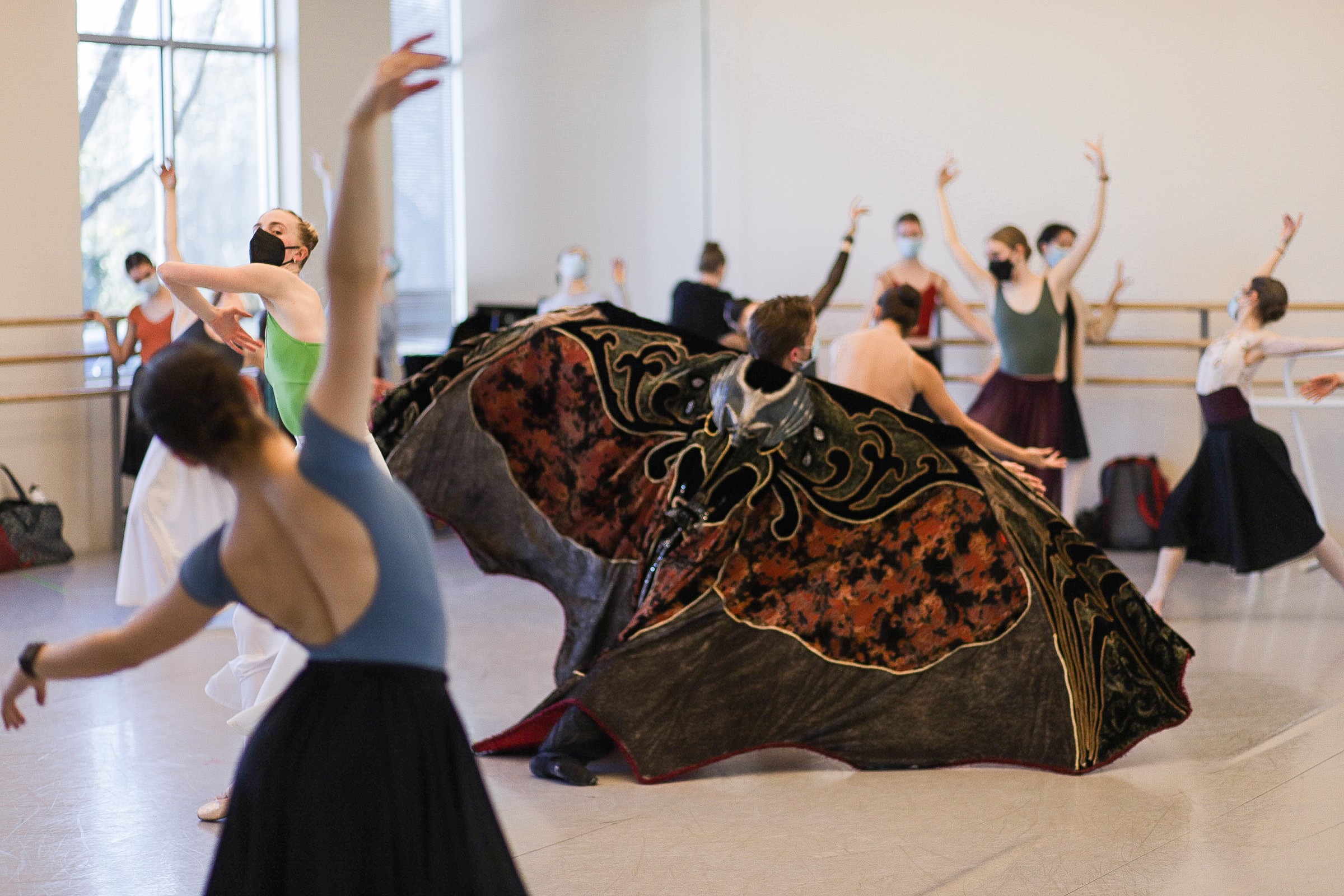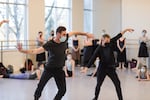
Chris Kaiser rehearses with his cape for the role of Dracula with the Oregon Ballet Theatre. He spoke with OPB about his experience as a ballet dancer without a venue, group rehearsals or performances during the COVID-19 pandemic.
Brian Simcoe / Oregon Ballet Theater
Chris Kaiser has spent the first couple months of 2022 getting into Dracula’s head.
“He is definitely blood thirsty, [and] I think a little heartbroken from his wife passing away,” he said. “It seems like nothing can scratch his itch and he just wants more.”
As a soloist with the Oregon Ballet Theatre, Kaiser plays the role of the Prince of Darkness in the company’s staging of the ballet Dracula, which is onstage in Portland until Feb. 26.
It’s a world away from where he was in early 2020, when, like all performing arts venues, the Oregon Ballet Theatre had to shut down abruptly. Like many people, Kaiser initially thought it was going to be a short break from the stage.
“We all kind of thought, you know, it was going be two weeks,” he said. “So we were like, ‘Oh nice, we get a two-week vacation.’”
Ballet is physically demanding, so the closure presented an altogether different physical challenge for Kaiser: How do you stay in elite dancing shape when you have no instructor, no dance company and no studio?
Kaiser lives with his partner, Jessica Lind, who also dances with the Oregon Ballet Theatre. Together they did what everyone else was doing: They threw together a quick, DIY work-from-home routine.
“We made our own ballet bar out of a PVC pipe,” he said. “We woke up every day and turned on a ballet class on YouTube and trained every single day.”
The time away from the ballet studio gave Kaiser the space to experiment a bit with his workouts. He did more cross-training than he normally would. He found the time to do some hiking and camping. He even dug into his home-brewing hobby.
“I ended up brewing quite a bit of beer over the pandemic,” he said with a laugh.
But it wasn’t all workouts and leisure time. The couple could do their normal ballet barre exercises, but their center practice — the movements that involve jumping and spinning through the air — that wasn’t possible in a Portland apartment.
Then that pandemic malaise began to settle in, as well.
“It felt like, ‘Why am I doing this?’” Kaiser recalled. “‘Why am I getting up? Why am I training? Am I going to be on the stage again?’”
“But in the back of my head,” he added, “I thought, ‘This is all I have. All I have is my training.’”
The Oregon Ballet Theatre would end up being closed for 18 months. Kaiser said something unexpected began to happen in that time: he didn’t get weaker; in fact, he suspects that he actually became stronger with the extra cross-training. But eventually, his body began to change.
“It was this blessing in disguise,” he said. “Also, this really difficult thing.”
Since Kaiser wasn’t able to dance ballet for six-to-eight hours a day, his muscles began to change. His turnout — the classic move where a dancer turns their legs so their knees face outward with their heels together — wasn’t quite right anymore.
“I feel like anatomically, humans are not supposed to stand in these positions,” he said. “So we ballet dancers kind of have to shape our muscles. The repetition of those movements is the only way to do it.”

Chris Kaiser rehearsing with the Oregon Ballet Theatre. The theater was closed for a year and a half, empty of live performances.
Brian Simcoe / Oregon Ballet Theater
When the ballet eventually resumed rehearsals months later, a lot was different. Dancers had to train themselves back into shape, but they also needed to re-learn how to dance with each other.
“When everybody’s dancing together, you have to kind of be aware of where you are in space and timing,” he said. “I feel like that’s a muscle on its own, and all the dancers kind of lost that muscle.”
There were plenty of new restrictions in place, too. The dancers had to rehearse — and still are rehearsing — wearing masks. For a time, only dancers who lived together could practice duets with one another. That led to Kaiser and Lind having the chance to dance professionally with each other at OBT for the first time, which was a bit of a thrill for him.
Over time, though, their muscles reconfigured. Their turnouts improved. They regained that sense of dancing alongside each other.
After those months of cross-training and doubt, Kaiser said everything felt fresher than it had in a long time.
“It’s almost like, ‘Wow, this is a new art form that I discovered,’” he said.
Slowly, performances began to return, too. First a live-streamed ballet with a virtual audience, then a live show outside along the Portland waterfront. Then, finally, back to the theater.
Now Kaiser is onstage as Dracula. Two years into the pandemic, he’s still finding ways to push his body, embodying a character that’s always in tension.
“The way I carry myself, I feel like I tend to be always struggling,” he said. “Like, I’m so hungry, it’s coming from the inside out.”
Listen to Chris Kaiser’s conversation with OPB Weekend Edition host John Notarianni using the audio player above.




